Traditional Ecological Knowledge (TEK) in the Philippines helps create sustainable practices that protect the environment and improve food security. TEK includes local methods, such as intercropping, which is planting different crops together, and seed-saving, which is keeping seeds from one season to plant in the next.
These methods are important for conserving biodiversity, or the variety of plants and animals in an area.
However, modernization poses a threat to TEK. To address this, combining TEK with modern science offers new ways to enhance sustainability. For example, the Muyong system is a traditional method of forest management used by indigenous communities. This system shows how local practices can effectively support environmental health.
Community involvement is crucial for these practices to succeed. Engaging local people helps ensure that TEK is respected and practiced effectively.
Understanding these key aspects can lead to better conservation efforts and highlight the importance of sustainability in the Philippines.
Overview of Traditional Ecological Knowledge
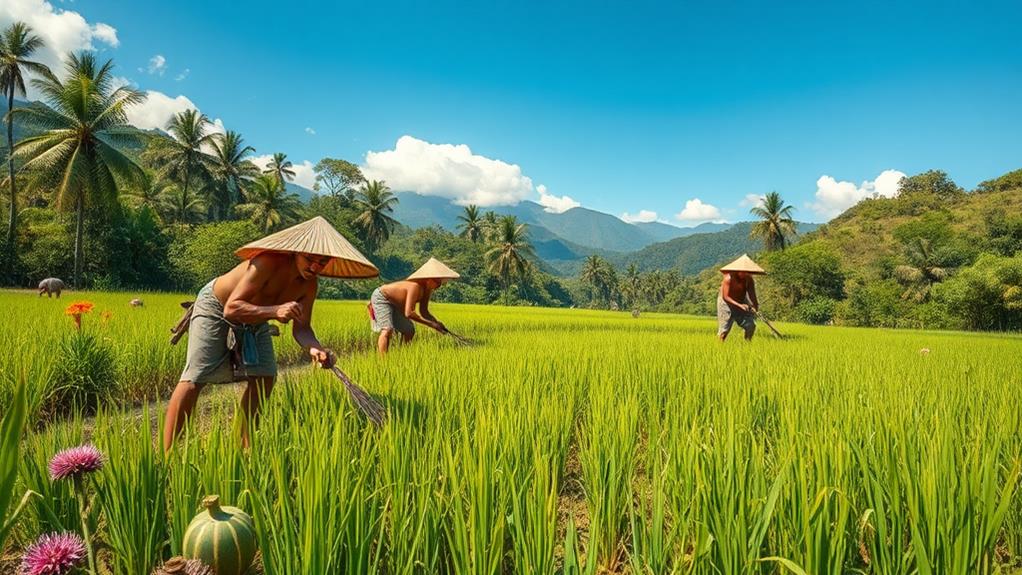
Traditional Ecological Knowledge (TEK) in the Philippines is a collection of local and Indigenous wisdom developed over many generations.
TEK includes sustainable practices that are specific to different environments. This knowledge is shared mainly through oral traditions, stories, and cultural practices, which help strengthen community bonds among Indigenous people.
Incorporating TEK into conservation efforts improves biodiversity and protects the environment. For example, using TEK in freshwater ecosystems helps them become more resilient to environmental changes.
Sustainable farming methods based on TEK, like intercropping and seed-saving, enhance food security and protect the environment.
It is important to recognize and document TEK for better natural resource management. As modernization and climate change pose challenges, valuing TEK helps maintain cultural heritage and ensures resources are used sustainably.
By supporting TEK, we can ensure that future generations benefit from the ecological wisdom of Indigenous communities. Therefore, TEK isn't just an old practice; it is essential for modern environmental strategies in the Philippines.
Significance of Indigenous Practices
Indigenous practices in the Philippines are essential for sustainable resource management and community resilience. These practices are based on Traditional Ecological Knowledge, which includes effective methods for biodiversity conservation.
For example, the Muyong system used by the Ifugao people employs selective harvesting techniques that help maintain ecological balance. Another example is the Kankanaey's Laton practice, which supports social-emotional learning in children and emphasizes the cultural significance of these practices in education.
Indigenous knowledge systems provide important insights for local ecosystem management. They include traditional agricultural methods like intercropping and seed-saving, which enhance food security and promote biodiversity conservation.
By combining traditional knowledge with modern practices, communities can strengthen their resilience against climate change impacts, such as droughts and flooding. Moreover, these practices preserve cultural identity and foster community cohesion. They demonstrate centuries of adaptation to environmental changes, showcasing their value in contemporary resource management.
Challenges Facing TEK Today
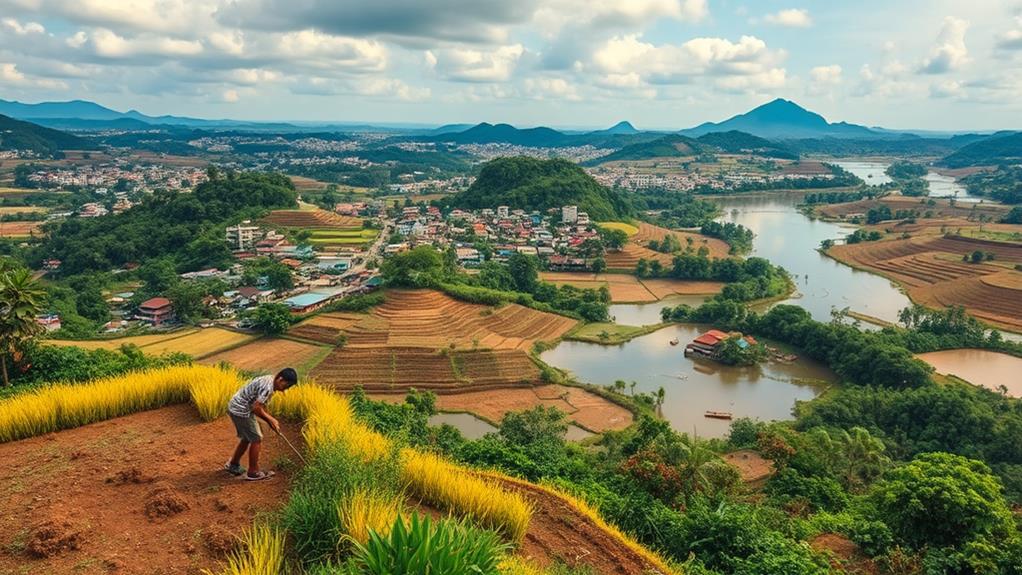
In recent years, preserving Traditional Ecological Knowledge (TEK) has become more difficult due to modernization and globalization. For example, urbanization in tourist areas like Baguio City causes environmental damage, which harms TEK practices. This situation threatens not only the environment but also the cultural heritage linked to these traditions.
Moreover, the use of exotic species for planting is causing a decrease in native plants. As native seeds become hard to find, biodiversity loss increases, affecting the natural balance. This change weakens traditional resource management methods that have supported local communities for many years.
Additionally, growing population demands make it even harder for these communities to keep sustainable practices based on TEK.
To overcome these challenges, there's a need for policies that balance economic growth and environmental protection. Without these policies, it will be hard to blend TEK with modern practices, which could harm both the environment and cultural identity.
Therefore, it's crucial to recognize and tackle these challenges to secure the future of TEK in the Philippines.
Opportunities for Sustainable Development
Integrating Traditional Ecological Knowledge (TEK) into modern practices offers many chances for better sustainable development in the Philippines. Using indigenous knowledge can help protect biodiversity and enhance ecosystem services, especially in sensitive areas like freshwater ecosystems.
- TEK supports better decision-making. It adds to scientific data, creating more effective conservation strategies. For example, combining local knowledge with scientific research can lead to better protection of endangered species.
- Reviving indigenous practices can promote sustainability. Systems like Muyong forest management help maintain healthy forests while providing resources. This method involves community management, ensuring trees are used wisely.
- Local economies can become stronger. Working with groups like the Bukidnon Umayamnon Tribe can create jobs through bamboo and cocoa farming. This not only helps families earn money but also encourages sustainable land use.
- Cultural heritage can be preserved. Supporting indigenous methods keeps cultural identities alive and promotes responsible resource management. For instance, traditional farming techniques often protect soil health and biodiversity.
- TEK aligns with global goals. Including TEK in government policies supports the United Nations Sustainable Development Goals (SDGs). This helps local projects gain recognition and support, improving community initiatives.
Case Studies in the Philippines
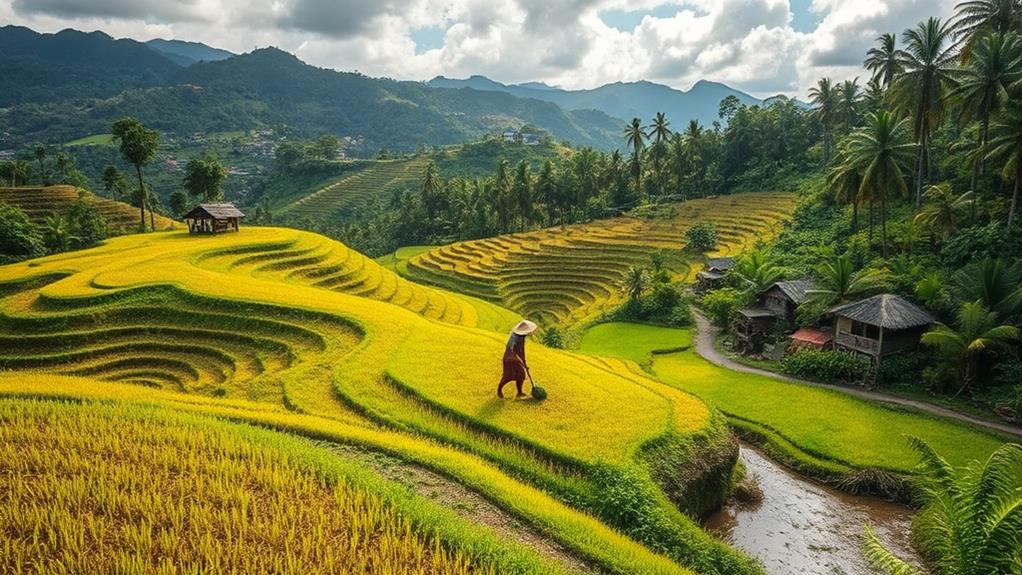
Case studies in the Philippines show how Traditional Ecological Knowledge (TEK) helps in sustainable development. Indigenous groups like the Ifugao and Kankanaey use effective practices that support ecological balance and protect biodiversity.
| Case Study | TEK Practice | Outcome |
|---|---|---|
| Muyong System | Forest management | Sustainable forestry through selective harvesting. |
| Traditional Rice Landscapes | Rice farming | Increased agrobiodiversity and cultural services. |
| Laton Practice | Sustainable rice farming | Better social-emotional learning in children. |
| Local Fishing Practices | Fishing taboos | Improved conservation and sustainable freshwater management. |
| Matigsalog and Ata Tribes | Intercropping and seed-saving | Important for biodiversity conservation and food security. |
These examples show how traditional practices can solve modern environmental problems. The Muyong system demonstrates effective forest management, while traditional rice landscapes support diverse crops. Local fishing methods connect community values with conservation, highlighting the role of TEK in building resilience against climate change. By using these indigenous practices, the Philippines can achieve sustainable development and protect its cultural heritage.
Role of Community Engagement
Community engagement can significantly reshape conservation efforts in the Philippines.
Involving local communities helps incorporate Traditional Ecological Knowledge (TEK) into sustainable practices. For instance, the Matigsalog and Ata tribes share valuable insights about agricultural challenges, which can guide conservation efforts.
Participatory research methods, like focus group discussions, help validate TEK. These methods ensure that development projects align with what the community wants. An example is the Bukidnon Umayamnon Tribe, which focuses on climate resilience through local participation.
Strengthening community engagement creates a sense of ownership and unity. When communities actively participate, their unique knowledge influences resource management. This leads to better sustainability outcomes.
A participatory approach addresses local needs and boosts the ability to adapt to climate change. By prioritizing community engagement, conservation supports Indigenous Cultural Communities in leading their environmental initiatives.
This collaboration makes conservation strategies more effective and relevant to local realities, enhancing resilience for both people and ecosystems.
Integrating TEK With Modern Science
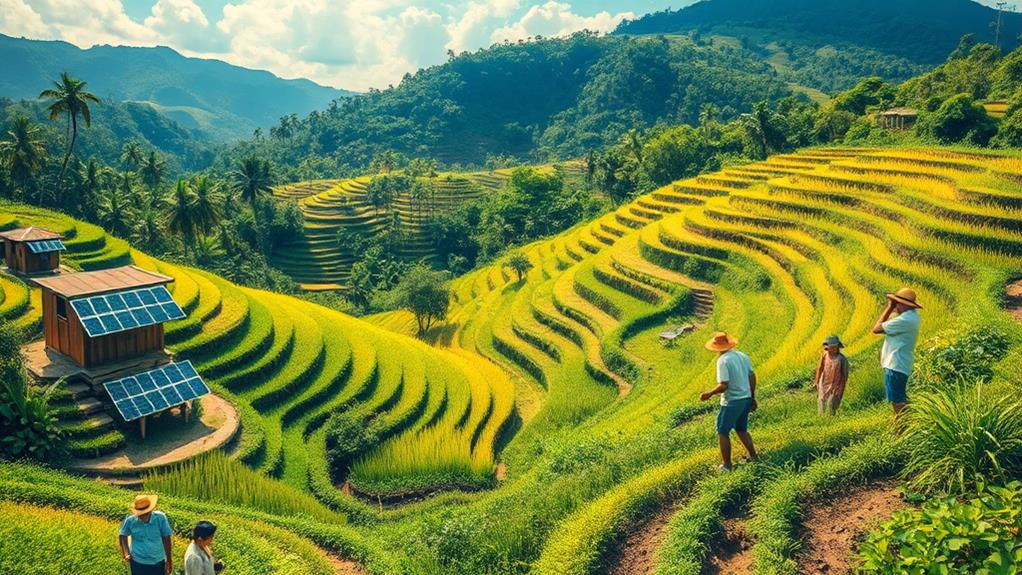
Modern science is essential for understanding environmental management. However, Traditional Ecological Knowledge (TEK) adds important insights that help improve conservation efforts. TEK, which Indigenous peoples have developed over many years, includes local practices that support sustainable resource use. For example, in freshwater ecosystems, local fishing rules often align with scientific guidelines for managing fish populations. This shows how TEK and modern science can work together effectively.
Integrating TEK into management plans allows for better solutions to complex environmental issues. This approach not only helps protect biodiversity but also strengthens resilience to environmental problems.
Furthermore, involving local TEK holders in decision-making respects their cultural values and recognizes their long-term knowledge of the environment.
The combination of TEK and modern science is vital for achieving the United Nations Sustainable Development Goals (SDGs). It emphasizes the link between cultural heritage and caring for the environment.
Impact of Climate Change
Climate change is a serious problem for communities in the Philippines. It affects agriculture and local ecosystems. Droughts and floods are happening more often and with greater intensity. This disrupts farming and leads to economic losses. Farmers face an annual loss of about 1.2% of the country's GDP due to these extreme weather events.
Indigenous groups, such as the Matigsalog tribe, are also struggling. They are experiencing lower harvests and greater challenges in adapting to climate changes. To cope, they use their Traditional Ecological Knowledge (TEK), which helps them manage their resources wisely.
Key points to note include:
- Climate change makes agricultural systems more vulnerable.
- Local knowledge is vital for creating effective ways to adapt.
- The Philippines is one of the countries most affected by extreme weather.
- Organizations like UNDP assist indigenous groups to promote sustainability.
- Climate change threatens both jobs and cultural heritage.
In summary, using TEK is crucial for building resilience against climate change. By combining local knowledge with modern methods, communities can improve their ability to adapt and protect their futures in a changing climate.
Future Directions for Conservation
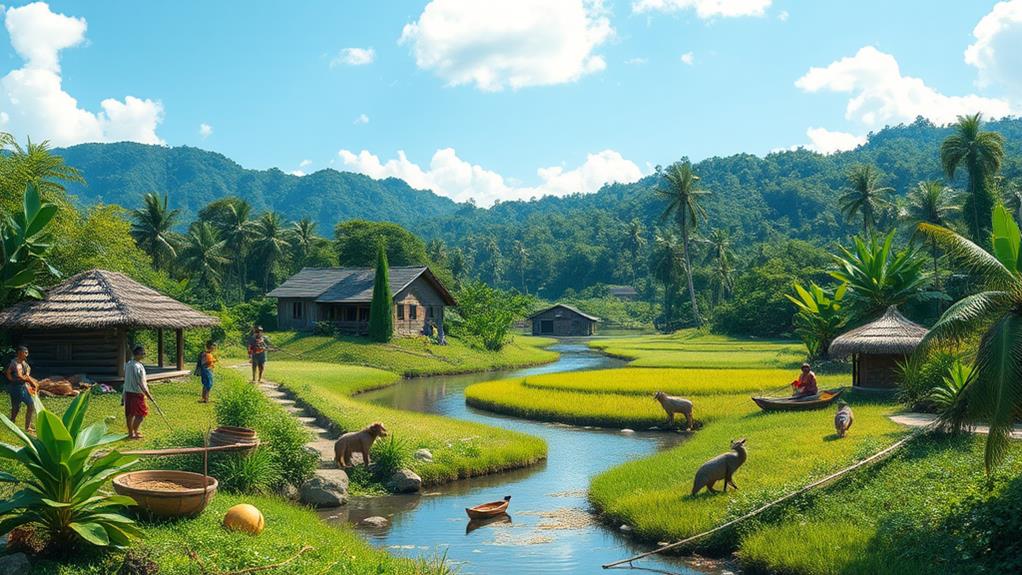
Integrating Traditional Ecological Knowledge (TEK) into conservation efforts in the Philippines can greatly improve biodiversity and sustainability. Indigenous practices, such as the Muyong and Lapat systems, offer valuable methods for managing resources wisely while honoring cultural traditions.
The Muyong system focuses on forest conservation and maintaining biodiversity. It helps protect forests by using traditional methods that have been passed down through generations.
The Lapat system promotes sustainable fishing practices. This method allows fish populations to thrive while providing food for local communities. Additionally, the Bukidnon Umayamnon initiatives aim to reduce deforestation and support eco-friendly agriculture.
Community-based projects, like those from the Bukidnon Umayamnon Tribe, effectively fight deforestation. They promote sustainable income through growing bamboo and cocoa.
Aligning these indigenous practices with national and global goals, such as the United Nations Sustainable Development Goals (SDGs), can strengthen conservation in the Philippines.
Ongoing engagement with local communities is essential. Adapting traditional practices to modern challenges helps build resilience against climate change and protects biodiversity.
Thus, integrating TEK into conservation strategies leads to more effective and inclusive environmental management in the Philippines.
Questions and Answers
What Is Traditional Knowledge in the Philippines?
Traditional knowledge in the Philippines is a key part of the country's cultural heritage. It includes ancient practices that help protect the environment. For example, many communities use local farming techniques that promote biodiversity, such as planting diverse crops together. This helps keep the ecosystem healthy. Furthermore, traditional knowledge in the Philippines also extends to cultural practices and rituals that have been passed down through generations. These traditions play a crucial role in preserving the country’s rich and diverse cultural identity. Experiencing t’boli culture traditions, such as their intricate weaving techniques and vibrant traditional music, offers a glimpse into the unique and ancient practices that have shaped the country’s cultural landscape. These traditions are not only a source of pride for Filipinos but also showcase the resilience and adaptability of indigenous communities.
Additionally, traditional knowledge supports community resilience. When natural disasters occur, local wisdom guides communities on how to respond effectively. People may rely on traditional building methods that withstand storms or floods.
Furthermore, this knowledge informs resource management strategies. Communities often have rules for using natural resources, like fishing limits or seasonal harvesting. These practices ensure that resources are not overused, allowing both the environment and culture to thrive.
What Are Some Examples of Traditional Ecological Knowledge?
Traditional ecological knowledge includes several sustainable practices. Sustainable farming techniques involve crop rotation and organic fertilizers to maintain healthy soil. Effective fishing practices can include using specific nets that reduce bycatch and allow young fish to escape. The use of medicinal plants is common, as many communities rely on local herbs for healing purposes. Innovative land management may involve controlled burns to clear underbrush and promote new growth. Water conservation methods include rainwater harvesting and drip irrigation to use less water. Finally, strategies that enhance biodiversity preservation often involve creating protected areas to support wildlife habitats.
What Is the Indigenous Knowledge System and Practices in the Philippines?
Indigenous knowledge systems in the Philippines focus on resource management and biodiversity conservation. These systems include practices like traditional farming methods, which use crop rotation and natural fertilizers from plants. Spiritual beliefs are also important, as they guide how communities interact with their environment.
These practices help communities become more resilient to changes, such as climate change. For example, using native plants in farming can lead to better crop yields and improved soil health. Additionally, they help preserve cultural heritage, as these practices are often passed down through generations.
What Is Traditional Ecological Knowledge and What Does It Have to Do With Sustainability?
Traditional ecological knowledge is important for understanding how communities care for their environment. It provides wisdom and practices that help manage natural resources effectively. For example, Indigenous peoples often use traditional planting methods that respect local ecosystems, promoting biodiversity.
This knowledge also offers sustainable strategies that protect both nature and the people living in these areas. For instance, some communities use controlled burns to prevent wildfires and support the growth of certain plants.
In a world that is changing rapidly due to climate change and other factors, traditional ecological knowledge can be a key tool for sustainability. It helps communities adapt while preserving their cultural heritage and the environment.